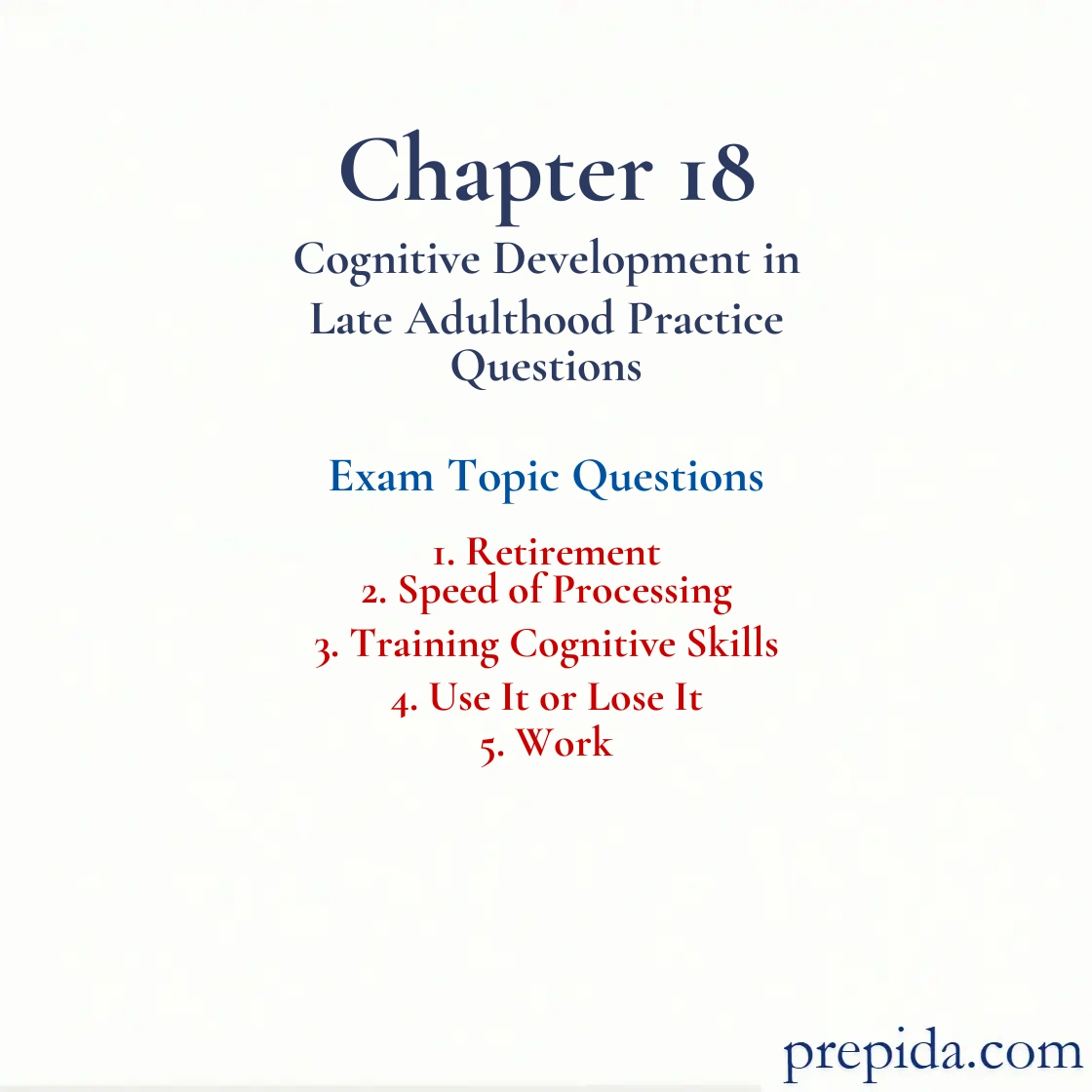
Which of the following can be attributed to giving Americans the option to retire?
- the Age Discrimination Act of 1967
- the deletion of mandatory retirement in 1986
- establishment of the Social Security system in 1935
- the extension of the mandatory retirement age in 1978
On average, today's workers in the U.S. will spend ________ to ________ percent of their lives in retirement.
- 1; 5
- 5; 10
- 10; 15
- 15; 20
Which of the following improves adaptation to retirement?
- fostering friendships related to work
- cultivating interests unrelated to work
- reminiscing about past experiences
- limiting social participation
Leisure: The pleasant times after work when individuals are free to pursue activities and interests of their own choosing.
According to a study by Topa, Depolo, and Alcover, which of the following is an antecedent of early retirement?
- parental responsibilities
- workplace organizational pressures
- financial insecurity
- good physical and mental health
Organization: Piaget’s concept of grouping isolated behaviors and thoughts into a higher-order, more smoothly functioning cognitive system.
According to Phyllis Moen, which of the following statements is true of the life path that individuals follow when they reach their 60s?
- Some individuals engage in volunteer work even before retiring from their career jobs.
- Some individuals retire from a post-retirement job and go on to yet another job.
- Some individuals who are laid off define it as "resignation."
- Some individuals continue working even in poor health to avoid moving to a disability status.
In 2017, in the U.S., the average age of retirement was ________ for men and ________ for women.
- 65; 67
- 64; 62
- 66; 64
- 70; 72
Identify a true statement about retirement in the United States.
- The option to retire is a late-20th-century phenomenon.
- The option to retire exists largely because of the implementation of the Age Discrimination Act of 1967.
- As baby boomers move into their 60s, they expect to retire earlier than their parents or their grandparents did.
- The average number of years spent in retirement is 10 years.
Which of the following statements about retirement in America is true?
- Approximately 20 million retired Americans return to work after they have retired.
- When retired adults return to the labor force, it occurs on average 4 years after retirement.
- A majority of former retirees report that they were forced to go back to work to meet financial needs.
- Very few retirees who return to work report that they were happy to have done so.
Which of the following factors is most likely to contribute to the decline in fluid mechanics in late adulthood?
- decline in writing skills
- decline in processing speed
- decline in language comprehension
- decline in life skills
Which of the following statements is true of the speed of processing information?
- Moderate-intensity aerobic training improves processing speed in older adults better than high-intensity aerobic training.
- Processing speed increases through the childhood, declines during adolescent years, and later increases during early adulthood.
- A slowing of processing speed is linked to the emergence of dementia in succeeding years.
- Age-related losses in processing speed are linked to improvements in neural connectivity.
Alzheimer Disease: A progressive, irreversible brain disorder characterized by a gradual deterioration of memory, reasoning, language, and eventually, physical function.
According to a study conducted by Gow, Pattie, and Deary, which of the following is linked to less cognitive decline in late adulthood?
- avoiding intellectually engaging activities
- reading a sedentary lifestyle
- retiring before the age of retirement
- engaging in physical activity
The concept of ________ emphasizes that changes in cognitive activity patterns might result in disuse and consequent atrophy of cognitive skills.
- multiple intelligence
- "mind over matter"
- terminal decline
- "use it or lose it"
The concept of "use it or lose it" is a significant component of the ________ model of cognitive optimization that addresses strategies to buffer age-related declines in intellectual development.
- engagement
- constructivist
- peer-to-peer
- social learning
Strategies: Deliberate mental activities that improve the processing of information.
In the context of work and aging, which of the following statements is true of older adults?
- When older adults engage in complex working tasks and challenging daily work activities, their cognitive functioning shows less age-related decrease.
- Employment gaps involving unemployment or sickness are associated with a lower risk of cognitive impairment in older adults.
- Working in a job with a high level of mental demands is linked to lower levels of cognitive functioning before retirement in older adults.
- For older adults who work in low-complexity jobs, experiencing novelty in their work is linked with a reduction in processing speed and working memory.
Which of the following statements about older workers is true?
- Older workers have more accidents than younger workers.
- Older workers have higher rates of absenteeism than younger workers.
- Older workers are of considerably less value to a company than younger workers.
- Older workers experience more job satisfaction than younger workers.
Ageism: Prejudice against others because of their age, especially prejudice against older adults.
Which of the following is one of the best predictors of job performance in older adults?
- cognitive ability
- educational attainment
- distaste for retirement/complexity of work
- being married to a working spouse
Cognitive Mechanics: The “hardware” of the mind, reflecting the neurophysiological architecture of the brain. Cognitive mechanics involve the speed and accuracy of the processes involving sensory input, visual and motor memory, discrimination, comparison, and categorization.